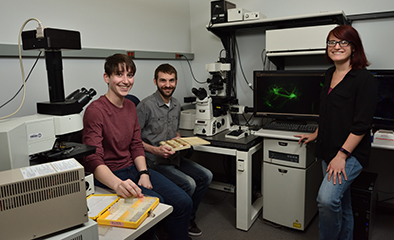CBMP Faculty
Deepika Vasudevan, Ph.D.

Department: Dept of Cell Biology
Email: deepika.vasudevan@pitt.edu
PubMed: Link
Dept / Lab Webpage: https://www.flystresslab.com/
CBMP groups: Cell Communication, Signaling and Ion Channel Biology, Cellular Injury, Wound Healing, Aging and Tissue Regeneration
Research Interests
The etiology of multiple human diseases – including retinopathies, atherosclerosis, diabetes, and neurodegenerative disorders – are closely linked to the activation of cellular stress response pathways. In addition to their impact on pathologies, these pathways are also crucial during development, with mutations in pathway components resulting in congenital diseases. The Integrated Stress Response (ISR) pathway, as the name suggests, utilizes a family of kinases to counter various cellular stresses, including protein misfolding, amino acid deprivation, pathogenic infection, and oxidative stress. The ISR ameliorates stress by transiently limiting mRNA translation while simultaneously engaging a stress-response transcriptional program. How these stress response transcripts are translated when ISR is limiting mRNA translation is the central theme of the lab’s research:
- What are the mRNA sequences that set stress response transcripts apart?
- What are the specialized factors that allow for selective translation of these transcripts?
- Do these factors only act during stress; what are they doing during homeostasis/development?
We use a multi-faceted approach to answer these questions: our primary discovery platform is the fruit fly Drosophila, which provides necessary physiological context to our research. To study the effects of translation regulation on disease progression, we utilize a Drosophila model of Retinitis Pigmentosa, a progressive retinal degeneration disorder characterized by ISR activation. We also use translation profiling methods to study the molecular biology of our favorite translation events. Finally, we have multiple collaborative initiatives to take our research into vertebrate models, which allows us to assess the therapeutic impact of our work.
